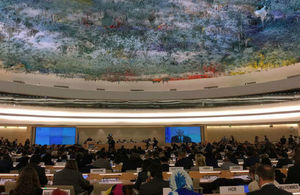Human Rights Council 32, Geneva: Joint statement on Rule of Law, 13 June 2016
United Kingdom of Great Britain & Northern Ireland Joint statement on Rule of Law, 13 June 2016.

The Human Rights Council takes place at the Palais des Nations in Geneva
Mr. President;
I have the honour to deliver this statement on behalf of the Rule of Law core group which consists of Ethiopia, Italy, Japan, Mexico, Morocco and the United Kingdom.
As we meet today to commemorate the tenth anniversary of the Human Rights Council, it is an opportunity to reflect on the interconnection between Human Rights and the Rule of Law. It is often said that they are two sides of the same coin. Yet, despite the immense efforts, both accomplished and ongoing, in the promotion and protection of human rights, much still needs to be done in the field of the Rule of Law.
All persons, institutions and entities, public and private, including the State itself, are, and must, be held to account by just, fair and equitable laws. The essence of the Rule of Law is that there shall be no “protection deficit”; everyone is entitled, without any discrimination, to equal protection of the law.
The Rule of Law includes, among other elements, good governance, the independence of the judiciary, together with its impartiality and integrity; equal access to justice for all; promotion of both formal and informal justice mechanisms; action against impunity; reforms at the international and national levels to deliver more effective and accountable institutions; and transparency in decision-making processes.
The Rule of Law is a guarantee against arbitrary use of power, premised on certainty of the law and protection of the rights of individuals. There is potential for developing the Rule of Law in the Human Rights Council that remains untapped to date.
Strengthening the Rule of Law at national and international levels is a key priority to be collectively pursued in relation to which the Human Rights Council can play a very important role. It requires a variety of much needed human–rights compliant and reinforcing actions such as the strengthening of laws and justice mechanisms, including traditional and informal justice systems, providing redress, fighting against corruption, and consolidating good governance.
In this regard, access to justice opens the door to a plurality of mechanisms and processes. The rule of law is not only about the need for functioning judicial systems and an honest, impartial and expert judiciary; it is also about the judiciary being accessible to the public. It is not only about formal institutions such as the courts, but also informal mechanisms, such as mediation and participation in local and alternative methods of dispute settlement. It is not only about national and international courts, but also Human Rights institutions.
To sum up, Mr. President, the Rule of Law is at the intersection of the three pillars of the United Nations. It can be effectively used as a tool to lead to peace and security, to complement development and to promote the values of Human Rights. Our collective efforts in the Human Rights Council should develop and implement an Agenda for the Rule of Law; such an Agenda will act as a catalyst for advancing the cause of Human Rights.
Thank you Mr. President.